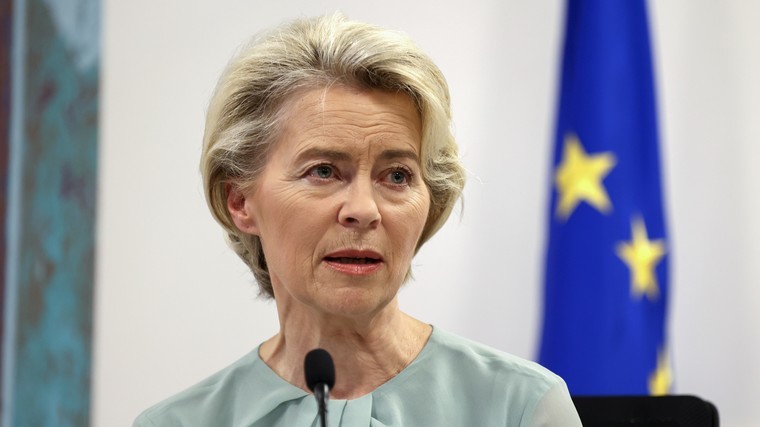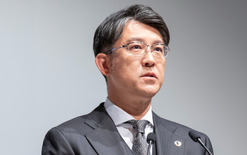EU to probe Chinese EVs

The European Union is launching an investigation into Chinese subsidies for electric cars as the bloc considers its industry’s ability to compete.
Ursula von der Leyen, president of the European Commission (EC), claims the global market is being swamped by cheap Chinese models.
“Their price is kept artificially low by huge state subsidies,” says Von Der Leyen, pictured. “This is distorting our market. As we do not accept this distortion from the inside in our market, we do not accept this from the outside.”
The investigation is opening despite concerns about retaliation from China, a sign of growing alarm over the ability of European manufacturers to compete with the Chinese industry.
Chinese marques, such as EV leaders BYD, MG and Nio, are preparing to pump up sales in Europe with a range of competitively priced EVs that – if successful – will impact mass-market manufacturers, such as the Volkswagen Group and Stellantis.
Domestic carmakers in China are under pressure amid slowing consumer demand that has sparked a price war.
As part of its ambitious Green Deal plan to cut emissions, the EU has implemented an effective ban on internal combustion engine (ICE) cars starting in 2035.
The EU this year conducted a temporary review of its state aid rules to counter massive subsidies provided by the US and China, especially with green technologies.
The bloc is particularly concerned about China’s economic practices, calling on Beijing to open up its market to rebalance the bilateral relations and to put in place instruments to address China’s coercive practices targeting countries such as Lithuania.
France’s finance minister, Bruno Le Maire, says: “We now need a European industrial strategy that is much more proactive, innovative and protective of our industrial interests in relation to China and the US.”
Robert Habeck, Germany’s economy minister, adds: “This is about unfair competition. It’s not about keeping efficient cheap cars out of the European market.” He added that if the EU investigation proved there are massive breaches of competition rules, “we must of course take action”.
In a note of caution, Germany’s VDA automotive association says the EU must take into account a possible backlash from China to such an investigation, reports
Automotive News Europe.
It notes policymakers should focus on creating the conditions for European players to succeed on their own patch – from lowering electricity prices to reducing red-tape hurdles.
China may take action
The Chinese government has criticised the EC for launching the probe into its EV subsidies, warning it will negatively impact economic and trade relations.
“It is a protectionist act that will seriously disrupt and distort the global automotive industry and supply chain, including the EU, and will have a negative impact on China-EU economic and trade relations,” according to a statement issued by the country’s Ministry of Commerce.
“China will pay close attention to the EU’s protectionist tendencies and follow-up actions, and firmly safeguard the legitimate rights and interests of Chinese companies.”
The EC’s investigation, which could take up to nine months, has prompted analysts to warn that Beijing may take retaliatory action – and there could be pushback from Chinese industry executives who say the sector’s competitive advantage is not due to subsidies.
Eurasian Group analysts say that should Brussels ultimately levy duties against subsidised Chinese EVs, Beijing will likely impose countermeasures to hurt European industries.
Other analysts say the probe could slow capacity expansion by China’s battery suppliers, although the move shouldn’t pose a big downside risk for Chinese EV makers because they could turn to other growing markets, such as south-east Asia.
It could hurt perceptions of Chinese EV makers as they expand abroad, according to Bernstein analysts. The manufacturers have been accelerating export efforts as slowing consumer demand in China exacerbates production overcapacity, reports Automotive News.
The China Passenger Car Association, which represents vehicle manufacturers, says the nation’s booming EV exports are not because the industry received large subsidies, but because that country’s supply chain is highly competitive.
Cui Dongshu, the association’s secretary general, says European concerns are an “inevitable accompanying phenomenon after China’s new-energy vehicles became stronger. Only when they become stronger will some people pay attention and some people will feel uncomfortable”.
The EC says China’s share of EVs sold in Europe has risen to eight per cent and could reach 15 per cent next year.
In 2022, 35 per cent of all exported electric cars originated from China, 10 percentage points higher than the previous year, according to US think-tank Centre for Strategic and Internal Studies.
Most of the vehicles and batteries they are powered with were destined for Europe where 16 per cent of batteries and vehicles sold were made in China in 2022, it says. The biggest EV exporter from China between January and April 2023 was Tesla with 40 per cent.





